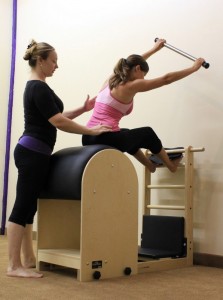Pre-Pregnancy Checklist
by Dr. Nicola McFadzean, Licensed Naturopath in California and Connecticut
- Start an exercise routine
- Start on prenatal vitamins, essential fatty acids and probiotics
- Identify food sensitivities and gluten intolerance
- Get tested for heavy metals
- Read up on vaccines
The general consensus on exercise for most stages of pregnancy is “do during pregnancy what you were doing prior to pregnancy”. Of course there are limits to this – I would not recommend a pregnant woman do marathon training, even if she ran a marathon the year prior to her pregnancy. That might be a little extreme! But nor should she really start running during a pregnancy if she wasn’t doing any regular exercise prior.
The idea is start now, so that once you are pregnant, you will be able to be more active, experience less fatigue, and continue an exercise regimen that can help you during the pregnancy and especially during labor. The owner of the pilates studio I attend did regular pilates throughout her pregnancy and her labor was 3 hours in total, and she pushed the baby out in two pushes. Isn’t that what we would all want?
Studies have shown that many birth defects occur in the first few weeks after conception – in the time period where many women do not even know they are pregnant yet. By the time six to eight weeks have gone by and the pregnancy is identified, much early neural development has occurred. Therefore taking prenatal vitamins, which are often rich in folic acid, is beneficial several months prior to conception.
I recommend women take essential fatty acids that are high in DHA, a nutrient that is crucial for healthy neurological development, and also probiotics for digestive support. Women are more prone to yeast infections during pregnancy because of the hormonal shifts, and yet there are limited treatments that are safe in pregnancy, so probiotics supporting healthy intestinal and mucosal flora can act as a preventive.
 With mum and baby sharing a blood supply, any immune activation that goes on within the mum during gestation may impact the baby. Immune reactions to gluten and other foods may create inflammation in the mother, which will pass through the baby, and may even create similar immune reactions in the child as he/ she develops.
With mum and baby sharing a blood supply, any immune activation that goes on within the mum during gestation may impact the baby. Immune reactions to gluten and other foods may create inflammation in the mother, which will pass through the baby, and may even create similar immune reactions in the child as he/ she develops.
I recommend mums avoid gluten and dairy as much as possible during pregnancy, firstly because of the inflammatory nature of these foods, and secondly because of the high incidence of these food sensitivities I see in young children. But getting tested for gluten intolerance, which is an auto-immune disorder with a strong genetic component, and other hidden food sensitivities (which also show similarities between mums and their kids in the families I work with) can promote the health of the developing child, and may prevent colic in infants and food allergies in the child as they grow up.
We know that whatever heavy metals exist in the mothers system concentrate up to eight times across the placenta, meaning that developing fetuses are strongly impacted by the toxic load of the mother, even more so than the mother herself. We know that heavy metals such as lead and mercury are potent neurotoxins, and I strongly believe that there is an association between heavy metal toxicity and autism.
I recommend that women who are not pregnant yet, and who do not plan to get pregnant for a few months, get tested (through a provoked urine test) and embark on heavy metal detoxificaiton, aka chelation. This may take several months, and needs to be completed several months before conception, so it’s not for the “we’re currently trying” couple. But taking the time to do this may save the baby many health issues down the track.
If I could encourage parents to do one thing towards the prevention of autism, it would be to educate themselves on vaccines – the risks, the benefits, and most importantly, their options regarding timing and number of vaccines given. I am not completely anti-vaccine, however I have seen so many families “lose” their children to autism after certain vaccinations, that there is no way I can deny a connection. To me the key is spreading out the vaccines as much as possible, and waiting until the child’s immune system is more developed to give vaccines. For example, is Hep B given on the day of birth really necessary, given that hepatitis B is transmitted through contaminated blood and via sexual contact? How much of a real threat is that to a healthy baby?
Books I would recommend would be Saying No to Vaccines by Sharon Tenpenny and What Your Doctor May Not Tell You About Childhood Vaccinations by Stephanie Cave. Evidence of Harm by David Kirby is focused more on evidence of the damaging effects of vaccines but is an interesting read. Whatever you decide about vaccines, you must be prepared on the day of your child’s birth – otherwise the “default” position will be to administer a variety of different shots, which is so overwhelming for the infant both psychologically and from an immune perspective. Have your doctor’s understanding and agreement ahead of time, with written instructions on what you will permit and what you will not. Just after the baby is born is not the time to be discussing/ negotiating with the obstetrician about vaccines. Being prepared is key!!
These five natural pre-pregnancy tips can make all the difference to a healthy, happy pregnancy and birth, but more importantly, set your child up for their own good health. I believe that in many cases autism, food allergies, ADHD and many other common childhood disorders are preventable. The baby’s first home is the womb, so the healthier the mum is, the healthier the baby can be.

